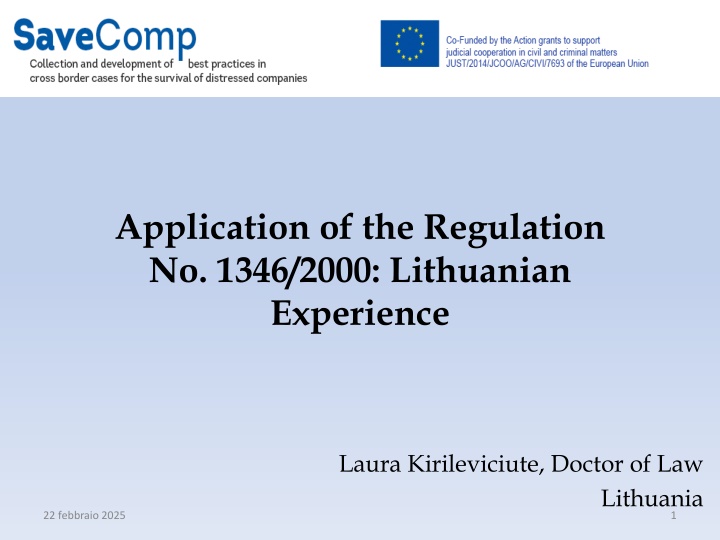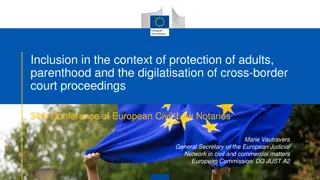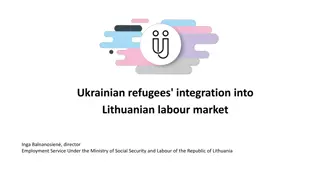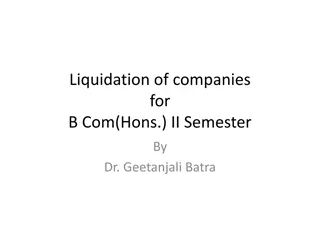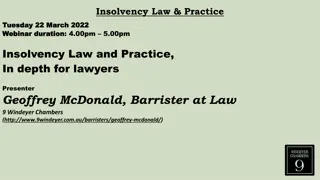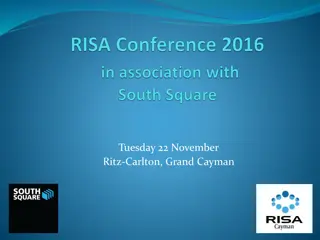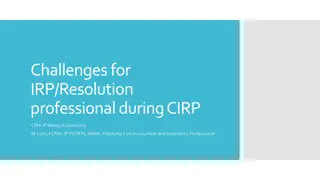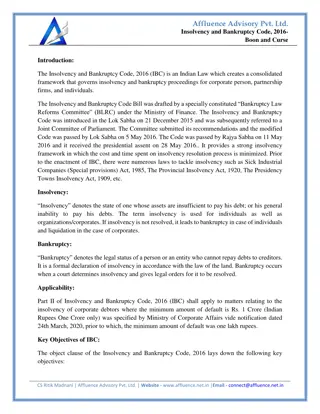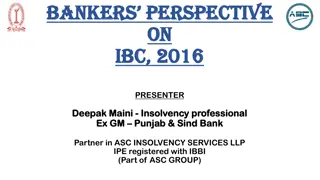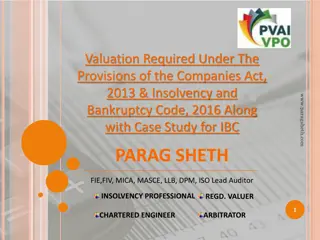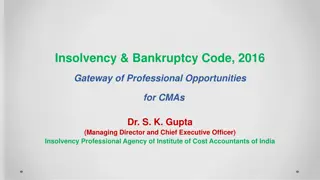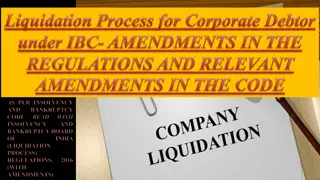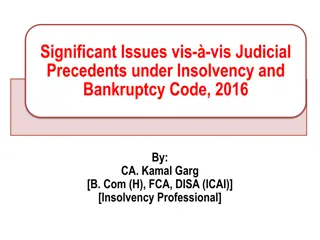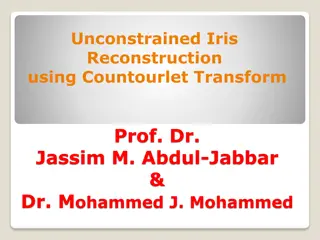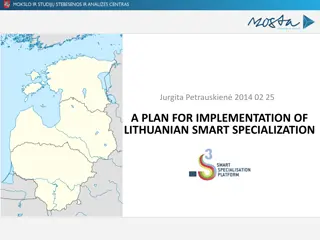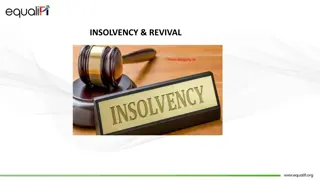Recognition Issues in Lithuanian Insolvency Proceedings
Recognition issues surrounding insolvency proceedings for natural persons in Lithuania, with a focus on challenges, resistance, and shifts of Center of Main Interests (COMI) to neighboring countries like Latvia. The burden of proof on informing creditors and the consequences of ongoing enforcement are also discussed in detail.
Download Presentation

Please find below an Image/Link to download the presentation.
The content on the website is provided AS IS for your information and personal use only. It may not be sold, licensed, or shared on other websites without obtaining consent from the author.If you encounter any issues during the download, it is possible that the publisher has removed the file from their server.
You are allowed to download the files provided on this website for personal or commercial use, subject to the condition that they are used lawfully. All files are the property of their respective owners.
The content on the website is provided AS IS for your information and personal use only. It may not be sold, licensed, or shared on other websites without obtaining consent from the author.
E N D
Presentation Transcript
Application of the Regulation No. 1346/2000: Lithuanian Experience Laura Kirileviciute, Doctor of Law Lithuania 22 febbraio 2025 1
Recognition issues Recognition of insolvency proceedings for natural persons - still discussions and resistance after 13 years of application of the Regulation Lithuanian Law on Natural Persons Bankruptcy since the 1st of March 2013 Insolvency tourism Center of the main interests (COMI) 22 febbraio 2025 2
Recognition issues Shift of COMI to Latvia for more favorable insolvency regime In 2012 The Court of Appeal of Lithuania (case No. 2T-26/2012) denied the application of the public policy exception in a case where a Lithuanian citizen had shifted his COMI to Latvia in order to declare himself insolvent Creditor s rights to be heard 22 febbraio 2025 3
Recognition issues Recognition of consequences of the insolvency proceedings Insolvency in Latvia and Lithuania several years Insolvency in the UK several months 22 febbraio 2025 4
Recognition issues The Court of Appeal of Lithuania (January 26, 2017 case No. 2-34-186/2017) Facts: the UK Insolvency Service didn t respect 1)the time limits and 2)the form requirements for the invitation form ( Invitation to lodge a claim. Time limits to be observed - Art.42, Art.40 of the Regulation) Judgment: LT court gave priority to the fact that the creditor was informed about the debtor s insolvency, the information was clear, comprehensive and informative. This fact was accepted as essential, but not the facts that deadlines for informing, and formal requirements for the invitation were not fully respected. 22 febbraio 2025 5
Recognition issues Burden of proof that creditor is informed rests on the debtor Letters, e-mails, other communication Previous discussion: in what form to inform the creditor about the insolvency proceedings Current approach: the creditor must be informed and the way he is informed does not play the key role. 22 febbraio 2025 6
Consequences to the ongoing enforcement Burden of proof that creditor is informed rests on the debtor Letters, e-mails, other communication Previous discussion: in what form to inform the creditor about the insolvency proceedings Current approach: the creditor must be informed and the way he is informed does not play the key role. 22 febbraio 2025 7
Exercising creditors rights in rem A liquidator appointed by a court which has jurisdiction pursuant to Article 3(1) may exercise all the powers conferred on him by the law of the state of the opening of proceedings in another MS A liquidator shall comply with the law of the MS within the territory of which he intends to take action, in particular with regard to procedures for the realization of assets Powers may not include coercive measures or the right to rule on legal proceedings or disputes 22 febbraio 2025 8
Exercising creditors rights in rem Article 5 of the Regulation: the opening of insolvency proceedings shall not affect the rights in rem of creditors (protection of secured creditors' rights) Cooperation between Latvia and Lithuania in insolvency cases Topical case: Klaip da County Court ruled that the attachment of assets in the enforcement procedure is not the rights in rem according to the Regulation (2017-03-02 Klaip da County Court, Case No. 2S-332-613/2017) 22 febbraio 2025 9
Main insolvency proceedings Not always clear what cross-border elements (debtor s assets, bank account, creditors, other aspects?) make the proceedings cross-border, and what makes the Regulation applicable to them A situation, when the Regulation is not mentioned as a legal base while opening the insolvency proceedings, may potentially lead to cross-border misunderstandings when the insolvency proceedings, opened in Lithuania, will have to be recognized in other MS 22 febbraio 2025 10
Secondary insolvency proceedings Lithuanian national law does not foresee the secondary insolvency proceedings. It means that Lithuanian court s jurisdiction and the secondary insolvency proceedings can only be and always are opened explicitly applying the Regulation. It took 11 years from May 2004 till May 2015 to open the first secondary proceedings (case No. B2-3000- 803/2015, Vilnius County Court, 2015-05-20). A year later - one more (Vilnius County court, 2016-04- 21). Both of them were opened to a German company, having a subdivision in Lithuania. In both of them, it is the secondary proceedings, opened after the main insolvency proceedings in Germany, therefore there was no need to assess the insolvency of the company. 22 febbraio 2025 11
Secondary insolvency proceedings Estonian court in 2006 opened the secondary insolvency proceedings for a Swedish company, which had an establishment, just in the past. At the time of opening the secondary insolvency proceedings in Estonia there were only some assets left in Estonia. The Swedish company ended their original economic activity in 2002, 4 years before the opening of the secondary proceedings. At the time the secondary proceedings were opened this company still had assets in Estonia 22 febbraio 2025 12
Secondary insolvency proceedings The first secondary insolvency proceedings in Lithuania were opened for a German company, which at the time of the request to open the insolvency proceedings was not carrying any business activities, all employees - fired, all valuable assets - taken to Germany and already sold in the main insolvency proceedings. Still left in Lithuania - just a few small portable items and several claims for their debtors (the value of assets about 100 000 EUR). Lithuania opened the secondary proceedings for a company, which had a subdivision in Lithuania and this subdivision at the time of opening the secondary proceedings was being liquidated as a consequence of the main insolvency proceedings in Germany. Ruling: debtor s activity in Lithuania could be qualified as an establishment and as a basis to open the secondary insolvency proceedings at the time of opening the main insolvency proceedings in Germany. 22 febbraio 2025 13
Conclusions Examples Natural persons insolvency Communication and good will 22 febbraio 2025 14
Thank you! Laura.Kirileviciute@gmail.com 22 febbraio 2025 15
